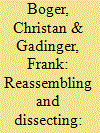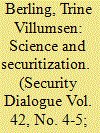|
|
|
Sort Order |
|
|
|
Items / Page
|
|
|
|
|
|
|
| Srl | Item |
| 1 |
ID:
180571


|
|
|
|
|
| Summary/Abstract |
This paper looks at how research communication in Norwegian migration and diversity research has changed over time. The main themes in the analysis are researchers’ motivations to enter the field and their experiences of, and reactions to, critique from colleagues and other audiences. Theory about credibility contests and boundary work on the interface of the academia and media, along with ideas about explicit and implicit normativity, inform the analysis. A main conclusion is that, as the field has matured, contests over normativity have changed from internal contests over implicit normativity to external charges of explicit normativity. The empirical analysis builds on 31 interviews with Norwegian researchers about their experiences of, and views on, public research communication in newspapers, social media, radio, TV and face-to-face panel debates. The interviewed researchers are of different age, gender, and ethnicity and they work in 10 different universities and research institutes across Norway.
|
|
|
|
|
|
|
|
|
|
|
|
|
|
|
|
| 2 |
ID:
076499


|
|
|
|
|
| Publication |
2007.
|
| Summary/Abstract |
What does it take to be an international relations (IR) scholar? IR discourses have tackled this question with focus on very different problems: the role and function of IR scholars for policy; the (ir)relevance and impact of IR knowledge and expertise in world politics; disciplinary history; or in studying IR's institutions. We argue that all these "disciplinary sociology" debates struggle with the relation between an internal scientific IR world and an external social context (policy, society). We reject this distinction and argue that science studies can help us to address these problems more adequately by treating IR as a scientific practice that is closely tied to its social environment. The article sets out to explore science studies' possible contributions. Based on science studies key assumptions, we develop a heuristic by which the relations between IR and its environment can be grasped systematically. From this perspective, IR is pivotally a culture constituted by different domains of practice. Hence, understanding IR scholars in "doing IR" requires taking into account their daily and sometimes trivial practices. For instance, writing an article in IR means much more than only thinking theoretically at a desk. We systematize the different domains of practices as the articulation of knowledge claims, mobilizing the world, autonomy seeking, alliance building, and public representation. "Being an IR scholar" and "producing IR knowledge" depends inevitably on these sets of practices and IR is intrinsically interwoven with its environment through these.
|
|
|
|
|
|
|
|
|
|
|
|
|
|
|
|
| 3 |
ID:
109591


|
|
|
|
|
| Publication |
2011.
|
| Summary/Abstract |
The interface between science and securitization has not been systematically addressed. This article argues from a Bourdieusian viewpoint that scientific arguments and 'facts' are at work in at least three distinct mechanisms within and around securitization. First, science communities/explanations can come to objectify an issue to the extent where securitization - and even politicization - becomes next to impossible. Second, science co-determines the status of a securitizing actor and thus influences the authority of the speaker in specific fields. Third, scientific facts can be mobilized in securitization claims by securitizing actors in attempts to seek back-up in the objective, disinterested aura of the scientific vocation. The RAND Corporation's objectivation of the issue of nuclear deterrence is taken as an example of the first mechanism, while climate change and democratic peace illustrate the other two mechanisms. The article questions whether securitization theory has adequately addressed the issue of context, points to a new research agenda and carves out practical reflexivity for security experts.
|
|
|
|
|
|
|
|
|
|
|
|
|
|
|
|
|
|
|
|
|